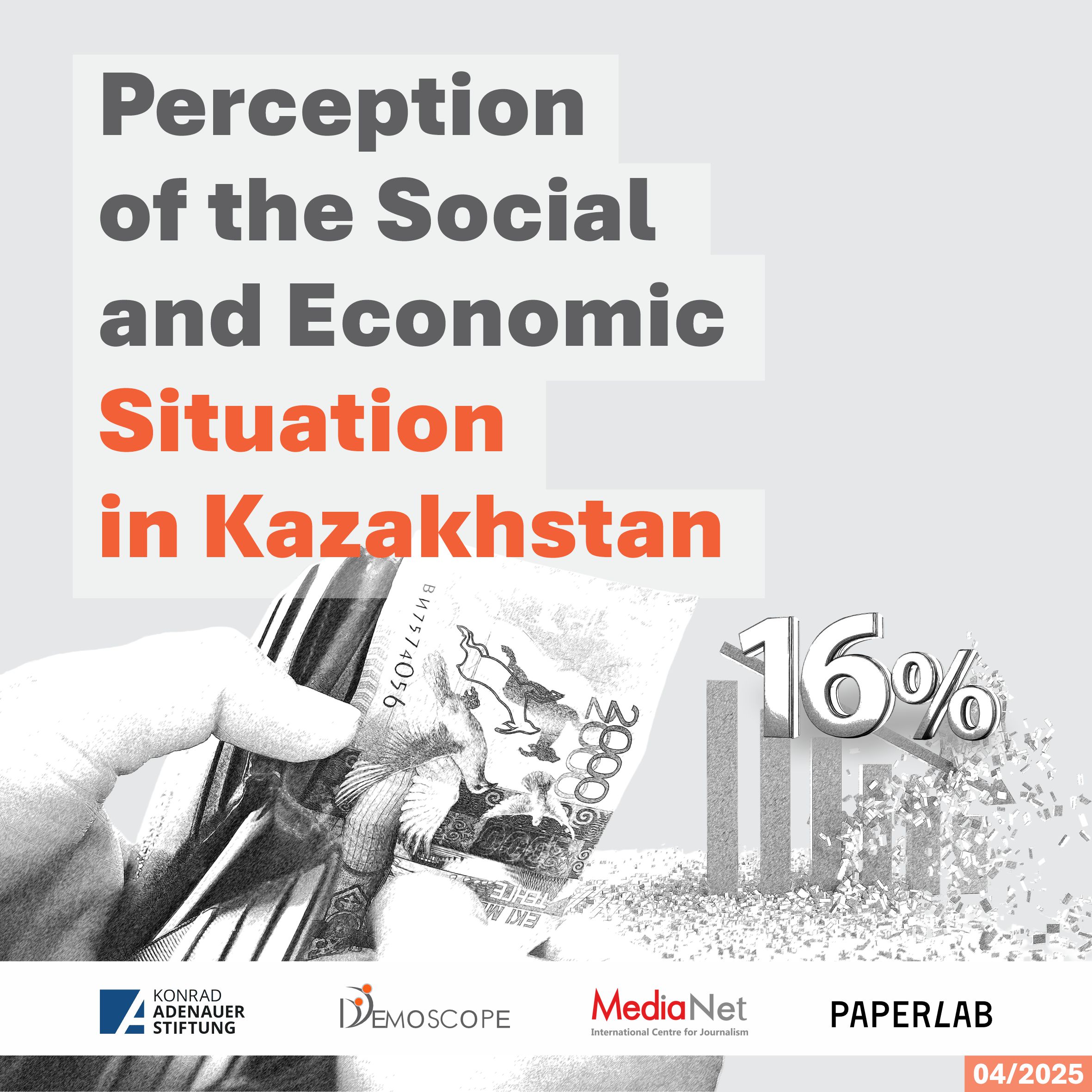
68.6% of citizens already report a significant rise in spending on essential goods
From March 20 to 31, 2025, DEMOSCOPE Express Public Opinion Monitoring Bureau conducted a survey on the topic of Perception of the Social and Economic Situation in Kazakhstan. The project is implemented by MediaNet International Center for Journalism in cooperation with the PAPERLAB Research Center and with the support of Konrad Adenauer Foundation.
On February 20, 2025, the Ministry of National Economy of the Republic of Kazakhstan submitted amendments to the Tax Code to the Mazhilis, proposing an increase in the Value-Added Tax (VAT) rate from 12% to 16%.
The results of the DEMOSCOPE survey show that the majority of citizens view the VAT increase negatively: 56.7% of respondents do not support the fiscal reform, 18.4% had not heard about the proposed changes, and only 11.8% expressed approval. Meanwhile, 8.1% reacted to the initiative with indifference.
Rising Expenses and Financial Uncertainty
An increase in the tax burden on businesses, coupled with the lowering of the VAT threshold to 15 million tenge, will inevitably lead to a rise in prices. Even now, 68.6% of Kazakhstanis have reported a significant increase in spending on food and essential goods over the past three months. Another 13.9% have noted a slight increase in such expenses. Meanwhile, 11% stated that their spending remained unchanged, and only 2.8% reported a decrease in expenditures.
Against this backdrop, half of the respondents (51.5%) are not confident in their financial well-being over the next 12 months. Of these, 21.6% are completely unsure, while 29.9% said they are more likely to feel uncertain. On the other hand, 41.8% assess their financial situation as stable: 21.9% are rather confident, and 19.9% are fully confident in their financial stability for the upcoming year.
A telling pattern emerges in the age correlation on this issue: younger people feel more financially secure than middle-aged and older generations. For instance, 57% of respondents aged 18–29 are confident in their financial well-being. Among the 30–39 age group, this figure drops to 41.6%. The highest level of concern is observed in the 40+ age group, where only 35% feel confident about their financial future.
Main Concerns of Kazakhstanis
At the same time, the rise in prices for essential goods is not the top concern among Kazakhstanis. DEMOSCOPE Bureau analyzed the dynamics of key public concerns by comparing data from November 2024 and March 2025.
The top concern among citizens is low income and wage levels — 47.4%. In November 2024, this figure was 37.6%.
In second place is corruption, which worries 43.6% of respondents, compared to 26.8% in 2024.
The third most pressing concern is the rise in prices of essential goods — 33.9% (28.3% in 2024).
Among other social issues, Kazakhstanis pointed out:
- Low levels of pensions, benefits, and scholarships – 30.8%
- Unsatisfactory education system – 27.1%
- Polluted environment – 25.9%
- Lack of jobs and employment difficulties – 22.6%
- Lack of affordable housing or poor housing conditions – 19.4%
- Unsatisfactory healthcare system – 18.3%
- Poor transport infrastructure (roads, sidewalks, etc.) – 12.3%
- Problems with public utility infrastructure – 7.5%
Decline in Trust in the Government
At the 4th session of the National Kurultai on March 14, President Kassym-Jomart Tokayev commented on changes to the tax burden on businesses and other government reforms, and issued a number of instructions to the government. However, a DEMOSCOPE study showed that 58.9% of Kazakhstanis had not heard about the Kurultai session, while 41.1% were aware of the event.
Overall, 39.1% of citizens expressed skepticism, believing that the government would implement only a small portion of the president’s instructions or almost none at all. Another 19.4% think that only half of the instructions will be fulfilled. A more optimistic 20.4% of respondents believe that most or all of the instructions will be carried out. Meanwhile, 21.2% found it difficult to assess.
These results may be explained by the public’s evaluation of the government’s performance. A comparative analysis of DEMOSCOPE data from November 2024 and March 2025 showed that public trust in the government has sharply declined over the past four months. The share of citizens who believe the authorities are not coping with their responsibilities increased from 39.3% to 65.7%. At the same time, the number of citizens who positively assess the government’s work has halved—from 46.7% in November 2024 to just 23.8% in March 2025.
Note: For some questions, respondents were allowed to select multiple answers. Detailed survey results are available on the project website. The press release and infographics in Kazakh, Russian, and English are available via the link. When using this material, a hyperlink to the DEMOSCOPE website is required.
Methodology: From March 20 to 31, 2025, a total of 1,100 people were surveyed across 17 regions and cities of republican significance (Astana, Almaty, Shymkent). The survey was conducted via telephone interviews with mobile subscribers in Kazakhstan. The sampling frame was based on a database of numbers generated using a random number generator. The telephone survey was carried out by the contact center of KT CloudLab LLP. The survey included 47.4% men and 52.6% women aged 18 and older. 65.7% preferred to respond in Kazakh, while 34.3% chose Russian. Of the respondents, 76.3% were Kazakhs, 11.3% Russians, and 12.4% represented other ethnic groups. 65.8% of respondents live in urban areas, and 33.7% in rural areas. The data were weighted by gender and age of the respondents. The maximum margin of error with a 95% confidence level does not exceed 3%. The response rate was 11.3%. The survey was conducted by the MediaNet International Center for Journalism Public Foundation with the support of Konrad Adenauer Foundation. The survey data reflect the views of the respondents. For more information, please contact Snezhana Tsoy: snezhana.tsoy@medianet.ngo.
